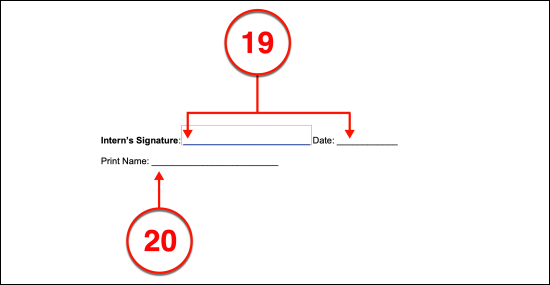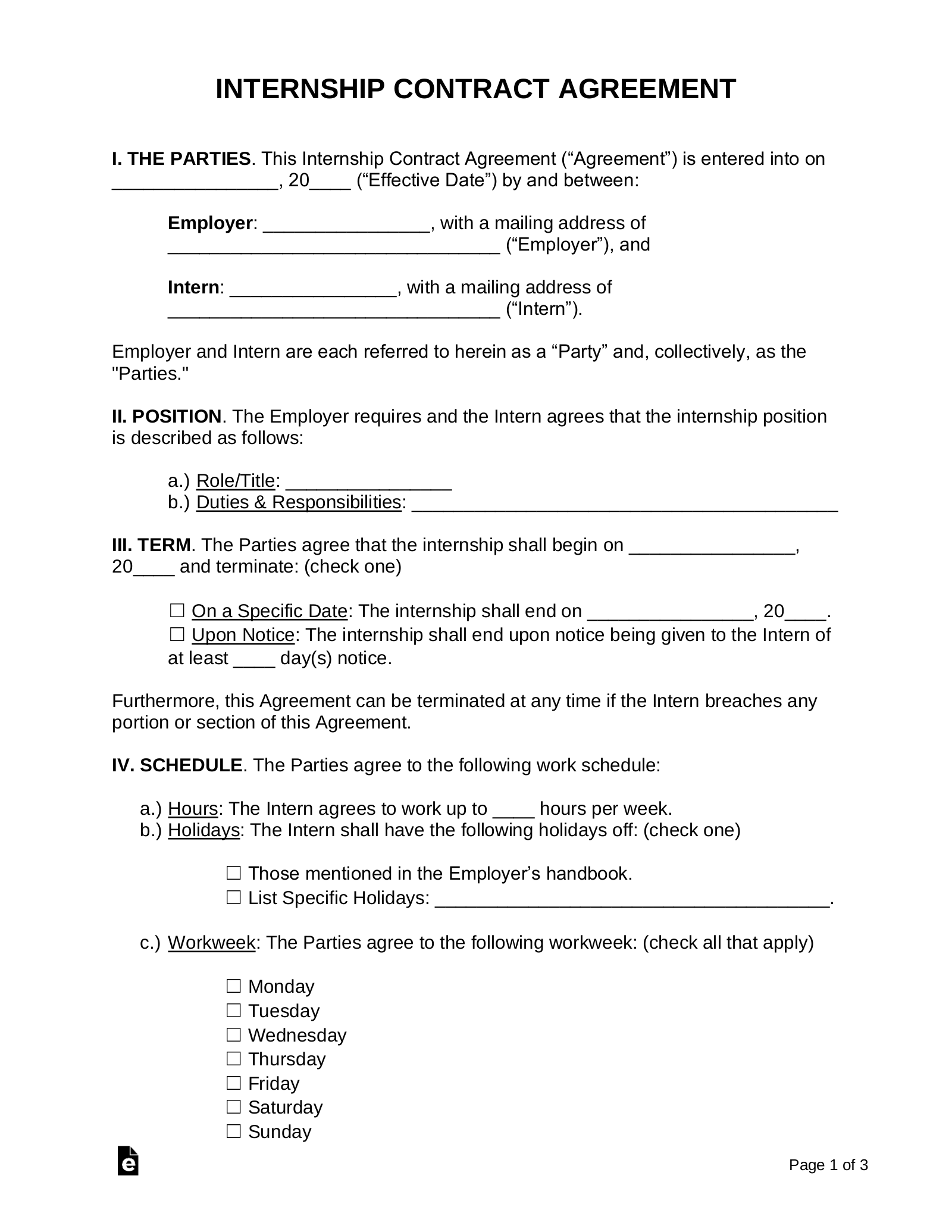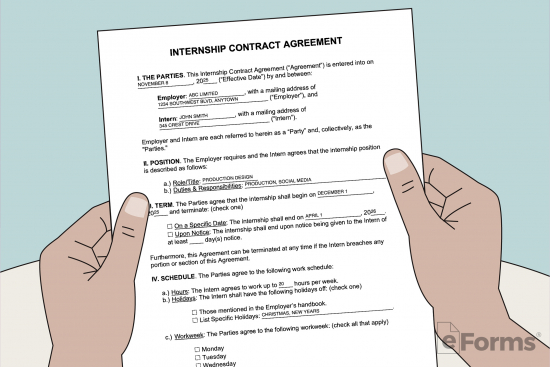Updated January 12, 2024
An internship contract allows an employer to hire an intern that agrees to work on an unpaid basis. The intern agrees to provide their services in exchange for on-the-job training, experience in the field, and educational credits (if applicable).
Common Types
- Summer internships;
- Short-term;
- Student;
- Post-University;
- Government;
- Non-profit; and
- For any type of specialty or trade.
Table of Contents |
What is an Intern?
An intern is a person that agrees to work on an unpaid basis. The work that an intern can conduct can only “complement” and not “replace” a paid employee. Internship positions are typically between 3-6 months unless part of a University-related program.
Primary Beneficiary Test
When hiring an intern, an employer must follow these seven (7) rules:
- That there is no promise of compensation;
- That hands-on training is being provided;
- That the position is tied to the intern’s formal education;
- That work-times accommodate any academic schedule;
- That the internship period is limited to provide education;
- That the work complements and doesn’t replace a paid employee; and
- That the internship does entitle permanent employment.
Source: Department of Labor
How to Find Interns (5 steps)
2. Review Candidates
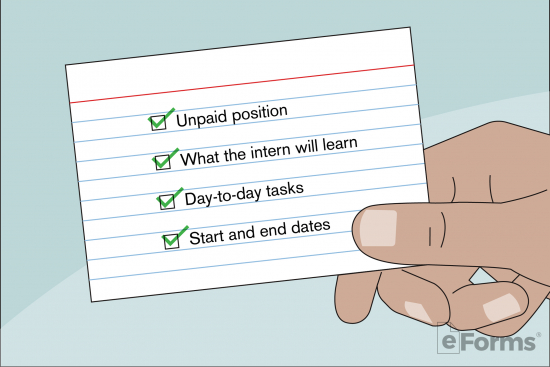
When accepting candidates, it’s best to make it known it is an unpaid position. The position should also include what the intern will be learning and their day-to-day tasks. It’s required to reveal the start and end dates and that in no way does the internship give the intention of future employment.
3. Setup Interviews

It’s best to set up interviews in the area where the intern will be working or remotely (via Skype or Zoom). In the interview, it’s best to ask what the person studied in school and how the position will apply to their studies.
Obtain the candidate’s personal information and have them complete the following forms:
4. Decide Who to Hire
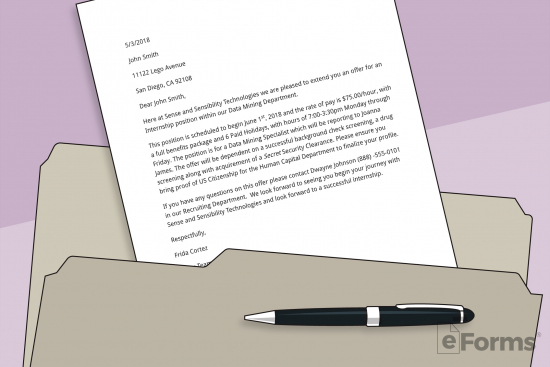
After conducting interviews and reviewing the applications, it’s time to decide who to hire. If the person is interested in the position, the work hours and start times should be forwarded to the intern.
When ready, send the potential hire an offer letter.
Are Interns Protected under Labor Laws?
Unpaid interns are protected in the nine (9) States of California, Connecticut, Illinois, Maryland, New York, Oregon, Texas, Vermont, Washington, and Washington D.C.
There is no federal law that protects individuals hired for internship positions.
Sample Federal Case (Wang v. Phx. Satellite)
In Wang vs Phoenix Satellite, Ms. Wang filed a case in a jurisdiction where no laws existed other than federal laws regarding interns.
Even though Ms. Wang was working in a hostile work environment, there were no laws that supported her claims. Therefore, the court ruled against her, thus, proving that there are no federal laws to protect interns.
Background
Defendant, Phoenix bureau chief, Mr. Liu, was accused of creating a hostile working environment and not promoting Plaintiff, Ms. Wang, to full-time employment. Ms. Wang was also trying to convert her student visa into a work visa (from the Citizen’s Republic of China). She claims the employer had made promises to give her permanent employment at the end of the internship.
Claims
Ms. Wang made claims the Phoenix bureau chief, Mr. Liu had made sexual advances towards her during the internship while also acting as her supervisor. When the internship expired, Ms. Wang was not kept as a permanent employee.
Ruling
The court found that Plaintiff’s claims were not applicable under New York’s State and City human rights laws. Due to this case, New York City amended its laws the following year to protect unpaid interns from discrimination and sexual harassment.
This case provides a recent example of where federal laws did not protect the unpaid intern.
ILLEGAL Internship Examples
Internships are prohibited from the following:
- Tasks that do not offer education or training;
- Promising compensation or employment at a later time;
- A position that is not related to the intern’s formal education;
- Work that is usually handled by a paid employee; and
- Requiring an intern to work during class time;
Can you Pay an Intern?
No. If an intern is paid, then their agreement automatically converts to an Employment Contract.
Once a promise of payment is established, the intern converts to an employee and is entitled to all protections and benefits required under federal and state laws.
Sample: Internship Agreement
Download: Adobe PDF, MS Word, OpenDocument
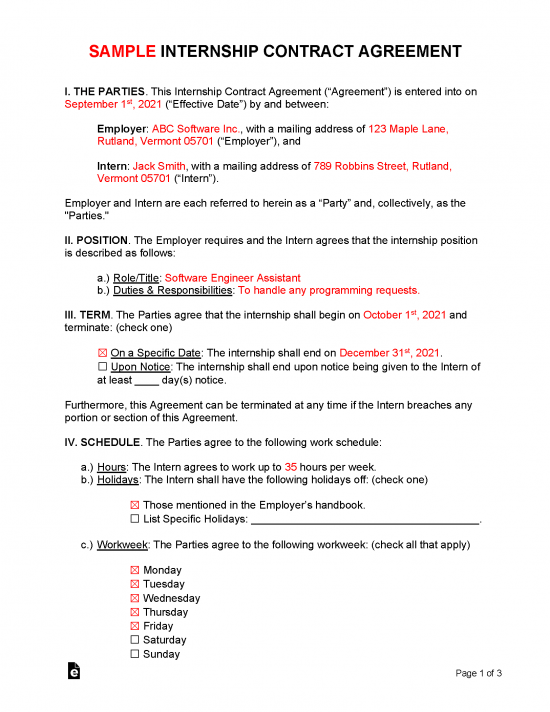
How to Write
Download: Adobe PDF, MS Word, OpenDocument
I. The Parties
(1) Internship Contract Effective Date. The calendar date when the Intern and the Employer formally enter this agreement should be presented in the opening article. Generally, this can be the same date as that of the final signature (recommended) however, it may also be set to a date that is after both signature dates.

(2) Employer Name. It is imperative that the identity of the Employer is established at the onset of this contract. Furnish the full name of this Company including any required suffix (i.e. “Corp.” or “LLP.”). This should be the name that the Employer legally functions and conducts business under. If the Employer is a Person (i.e. a Contractor) who has not incorporated or formed a Company, then the first, middle, and last name of the Employing Party should be documented.
(3) Employer Mailing Address. The mailing address required to contact the Employer or to send this Entity written notices and requests regarding the internship is required to fully identify this Entity. Furnish this address where it is requested.
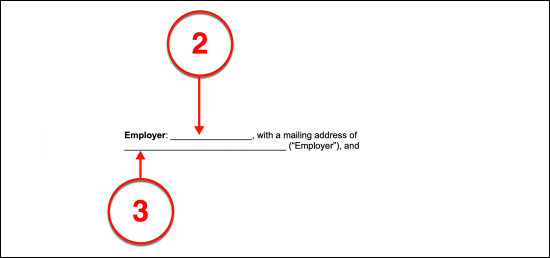
(4) Intern Name. The Intern who will be hired by the Employer as per this agreement should be named. His or her full name must be presented to this document as the Intern who will fulfill the Employer’s requirements. In most cases, this will be a Student, Protege, or Apprentice. Provide his or her first, middle, and last name to attach this Party to the Intern role.
(5) Intern Mailing Address. Furnish the Intern’s mailing address to the space available. This should be a well-maintained mailing address where all communications from the Employer to the Intern can be reliably received. If the Intern does not have a separate mailing address (i.e. a P.O. Box) then his or her home address may be used (provided he or she receives mail regularly at home).
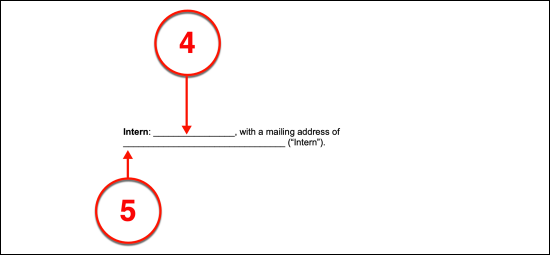
II. Position
(6) Role/Title. The Intern may be fulfilling a specific role or title. Attach the title that will be held by the Intern while he or she works for the Employer. For example, the Intern may be a “Bookkeeping Intern,” “Human Resources Intern,” or simply an “Intern” that provides general office help.
(7) Duties & Responsibilities. Every task or obligation the Employer expects the Intern to fulfill should be documented in the second article. In most cases, it is ill-advised to assign additional responsibilities to an Intern once the conditions of the internship have been established in this document, thus try to be as inclusive as possible. Note, that the Intern will not be obligated to perform any work tasks not listed in this area (Article II) or in the Tenth Article.
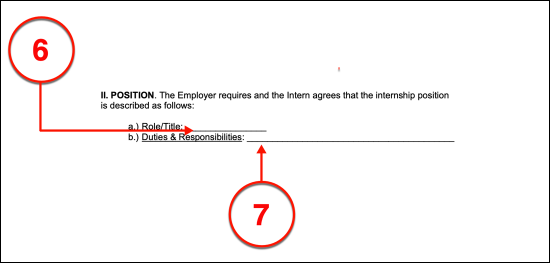
III. Term
(8) Internship Start Date. The calendar date when the Employer first expects the Intern to begin the internship assignment or position must be documented in Article III. This date must be on or after the effective date of this agreement.

(9) Predetermined Termination Date. The term of the internship is up to the discretion of the Employer and the Intern however, since many internships are attached to a specific academic semester or course, the opportunity to establish a termination date is presented in the first option presented by Article III. To place a termination date to the internship being discussed, select the “On A Specific Date” checkbox, then furnish the termination date to the statement made. If this will not be the case,m then leave this statement unattended and review the second option.
(10) Upon Notice Option. Some internships may go on for a considerable length of time and may not necessarily be dependent upon a Student’s semester or coursework. If so, then the internship may be set to terminate at the will of one or both Parties so long as the Terminating Party informs the Remaining Party of his or her intention to end the internship as of a specific date. To set this termination method as the way this internship should end, select the second checkbox statement in Article III and deliver the minimum number of days before the desired termination date when the Terminating Party must inform the other that the internship will end.
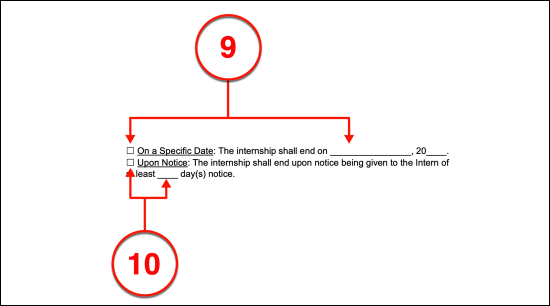
IV. Schedule
(11) Hours Per Week. Whether there is a set number of hours or not attached to the internship, the minimum number of hours of work required by the Employer of the Intern should be named. To this end, furnish the number of hours of work that the Intern will be required to complete on any given week of this internship. Bear in mind that some jurisdictions will impose regulations on the minimum and maximum number of hours that an Employer may require of an Intern so it is important to be up-to-date on the statutes enforced by the jurisdiction where this agreement will apply.
(12) Holiday Policy. Typically, Employers will have a policy in place determining which yearly holidays are observed by requiring no work done that day. If the Employer will dispense an Employer’s Handbook detailing which holidays the Intern will not be required to work, then place a mark in the first checkbox option available under “B. Holidays.” If so, it is strongly recommended that the Employer’s Handbook is attached to this agreement.
(13) Specific Holidays. If the Employer prefers to list specific holidays that the Intern will be excused from working then select the second checkbox option and document the name and date of every holiday that the Intern is not required to work.
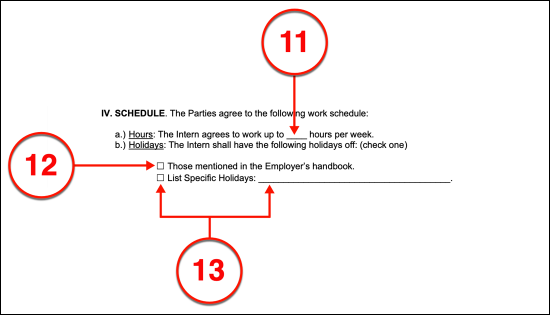
(14) Workweek. If the Employer will have specific days of the week when the Intern will be expected to work, then locate Item C. Here, mark the checkbox corresponding to each day of the week when the Intern must show up (or sign-on) for work. If there are no set days this may be left unattended however, it is generally in the best interests of both Parties to have specific days of the week for the internship to occur. Here too, local statutes may be set determining how many days of the week may be required of an Intern thus, make sure to consult the current governing laws where this document is in effect.
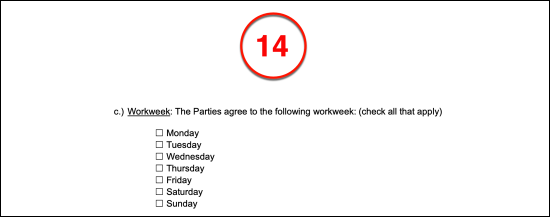
VII. Governing Law
(15) State Of Jurisdiction. As mentioned earlier, a specific State will be in charge of enforcing this agreement so long as it is compliant with the laws in place. Name the State whose jurisdiction will be applied to the content of this paperwork and the internship being defined.

X. Additional Terms & Conditions
(16) Remaining Agreement Requirements. Only the information defining the concerned internship, the conditions each Party must meet to satisfy this agreement, and the term or time frames involved that are included in this contract can be considered enforceable (so long as they are legal). Therefore, any topics or agreements that both Parties wish the other to adhere to that have not been documented thus far must be furnished to Article X. For instance, if the Employer has agreed with a School that the Intern is excused for special class trips that may occur during a day when the Intern is expected to work, then such a consideration should be documented. Furnish all such terms and/or conditions that should be part of this contract to Article X even if a properly titled attachment must be made to accommodate such additional information.

XI. Entire Agreement
(17) Employer’s Signature And Printed Name. The Employer should review this completed contract along with any attachments presented (and named in Article X) until he or she is satisfied that it represents the conditions of the internship accurately. When the Employer is ready, he or she must sign and print his or her name. In an event where the Employer is a formal Company or Business Entity, a Representative that is properly appointed by the Employer as a Signature Representative may sign and print his or her name to formally enter the Employer to this agreement.
(18) Employer’s Date Of Provided Signature. The current date at the time the Employer completes his or her signature and printed name must be dispensed.
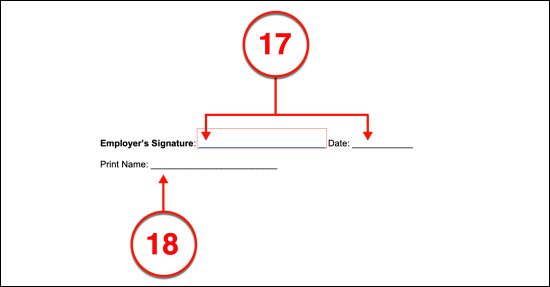
(19) Intern’s Signature And Name. The Intern should review every article and attachment presented. If he or she wishes to enter the agreement upon completing this review then the Intern must sign this contract and print his or her name.
(20) Intern’s Signature Date. The Intern’s report on the current calendar date at the time of signing is mandatory to complete the signature process.
